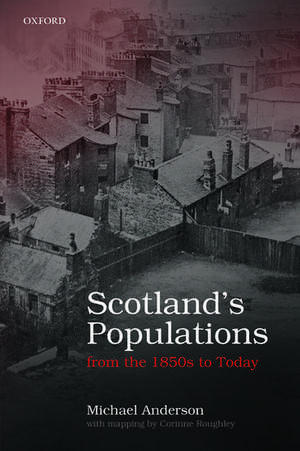Scotland's Populations from the 1850s to Today
Autor Michael Anderson Ilustrat de Corinne Roughleyen Limba Engleză Hardback – 7 mar 2018
Preț: 838.36 lei
Preț vechi: 1137.74 lei
-26% Nou
Puncte Express: 1258
Preț estimativ în valută:
160.44€ • 166.55$ • 133.78£
160.44€ • 166.55$ • 133.78£
Carte tipărită la comandă
Livrare economică 11-17 martie
Preluare comenzi: 021 569.72.76
Specificații
ISBN-13: 9780198805830
ISBN-10: 0198805837
Pagini: 480
Ilustrații: 191 maps, tables, and figures
Dimensiuni: 163 x 241 x 32 mm
Greutate: 0.86 kg
Editura: OUP OXFORD
Colecția OUP Oxford
Locul publicării:Oxford, United Kingdom
ISBN-10: 0198805837
Pagini: 480
Ilustrații: 191 maps, tables, and figures
Dimensiuni: 163 x 241 x 32 mm
Greutate: 0.86 kg
Editura: OUP OXFORD
Colecția OUP Oxford
Locul publicării:Oxford, United Kingdom
Recenzii
Rooted in an ocean of statistics, this book could easily have been a daunting read. It is to the author's credit that he has provided the interpretative tools necessary to navigate that ocean meaningfully, comprehensively and with considerable added value to existing scholarship. Furthermore, by harnessing quantitative evidence to qualitative evaluation, he has unlocked some of the individual and community experiences that lie behind the bald figures. This meticulously researched and far-reaching study should therefore be required reading for all who seek to understand the socio-economic, as well as the demographic, history and culture of modern and contemporary Scotland.
The scope of what is included in this volume in under 500 pages is astonishing: those waiting since Flinn for the next big book on Scottish demography will not be disappointed. A historian of less standing could not have pulled off such a feat...[it] will not only be invaluable for research and teaching, but will reward a broader audience with deep enough pockets.
[a] wonderfully informative and wide-ranging book
The breadth and depth of its content makes Michael Anderson's Scotland's Populations a rich meal of a book.
Anderson's book is a fine example, able to stand alongside the best national studies of European demography, by the likes of Livi Bacci or Wrigley and Schofield; in closely scrutinising the social, economic, political, and cultural context of demographic behaviour, it is superior to them.
MacEachern's work will be useful for specialists in a variety of fields.
This book presents scholarship of the highest quality, and a new standard point of reference has been achieved.
'A magisterial study of Scotland's population over the past one and a half centuries that by identifying and exploring recent and current demographic trends is highly relevant for our understanding of the main demographic challenges that face Scotland today.
It is a masterly demonstration of what can be achieved when writing the population history of a nation with a keen eye for the local and regional perspective
an important book ... Given the comprehensiveness and thoroughness of its analysis, it is certain that Anderson's book will become the standard work in its field ... It is impossible not to be impressed by the comprehensiveness of Anderson's work.
The scope of what is included in this volume in under 500 pages is astonishing: those waiting since Flinn for the next big book on Scottish demography will not be disappointed. A historian of less standing could not have pulled off such a feat...[it] will not only be invaluable for research and teaching, but will reward a broader audience with deep enough pockets.
[a] wonderfully informative and wide-ranging book
The breadth and depth of its content makes Michael Anderson's Scotland's Populations a rich meal of a book.
Anderson's book is a fine example, able to stand alongside the best national studies of European demography, by the likes of Livi Bacci or Wrigley and Schofield; in closely scrutinising the social, economic, political, and cultural context of demographic behaviour, it is superior to them.
MacEachern's work will be useful for specialists in a variety of fields.
This book presents scholarship of the highest quality, and a new standard point of reference has been achieved.
'A magisterial study of Scotland's population over the past one and a half centuries that by identifying and exploring recent and current demographic trends is highly relevant for our understanding of the main demographic challenges that face Scotland today.
It is a masterly demonstration of what can be achieved when writing the population history of a nation with a keen eye for the local and regional perspective
an important book ... Given the comprehensiveness and thoroughness of its analysis, it is certain that Anderson's book will become the standard work in its field ... It is impossible not to be impressed by the comprehensiveness of Anderson's work.
Notă biografică
Michael Anderson worked in the University of Edinburgh for forty years, initially in Sociology until he was appointed to the Chair of Economic History in 1979. He was the University's Senior Vice-Principal from 2000 to 2007. Over the forty years he taught a wide variety of Sociology, Economic and Social History, and Social Science Research Design courses. His research interests have included historical work on the family and demography, a large-scale census enumeration book database for 1851, and studies of the social economy of the household, both in the past and, through surveys and interviews, in the 1980s and 1990s. He holds Fellowships of the British Academy and the Royal Society of Edinburgh. He served on the Council of ESRC and chaired the Trustees of the National Library of Scotland for twelve years.Corinne Roughley is Fellow of Hughes Hall Cambridge and has wide-rangng interests in the spatial patterning of people and their activities from the Neolithic to the present.
